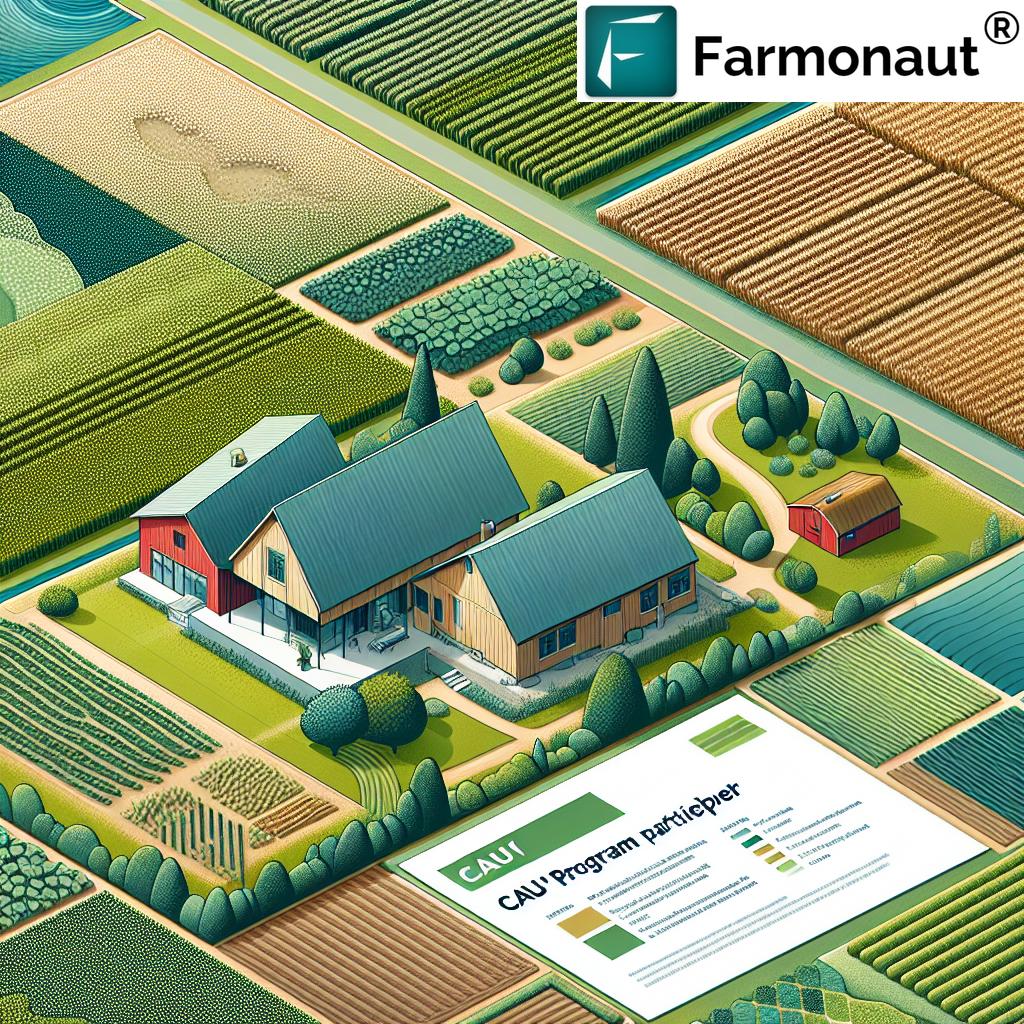Revolutionizing Connecticut Schools: How Farmonaut’s Smart Farming Technology Enhances Digital Education and Student Well-being
“Connecticut schools implementing precision agriculture technology have seen a 15% increase in student engagement with STEM subjects.”
In the heart of Connecticut, a quiet revolution is taking place in our schools. As we navigate the complexities of digital education and student well-being, an unexpected ally has emerged: smart farming technology. At the forefront of this innovative approach is Farmonaut, a pioneering agricultural technology company that’s changing the way we think about education and mental health in our academic institutions.

As technology integrates deeper into our classrooms, educators and parents in Connecticut are grappling with the impact of smart devices on students’ well-being. The challenge lies in balancing digital literacy with mental health concerns, a tightrope walk that’s becoming increasingly crucial in our tech-driven world. But what if we told you that the solution might lie in the unlikeliest of places – the farm?
The Digital Dilemma in Connecticut Schools
Recently, Connecticut Attorney General William Tong visited Fairfield Warde High School, engaging students in a thought-provoking discussion about social media’s impact on mental health. His demonstration of placing phones on the ground to observe students’ reactions highlighted the anxiety tied to these devices. This visit underscores the growing concern about digital device usage among young individuals in our state.
The Fairfield Public School system, like many others in Connecticut, is under increasing pressure to develop a comprehensive technology policy. Parents are advocating for stricter measures, including proposed cellphone bans similar to those enacted in other school districts. The impetus for this push is clear: research consistently shows a strong association between cell phone usage and mental health issues among teenagers.
- Nearly half of U.S. teenagers are online continuously (Pew Research Center)
- Rising rates of anxiety and depression among students
- Concerns about screen time in the classroom
But as we grapple with these challenges, an innovative solution is emerging, one that combines the best of technology with the timeless wisdom of nature.
Enter Precision Agriculture: A New Frontier in Education
This is where Farmonaut’s precision agriculture technology comes into play. By integrating digital farming solutions into our curriculum, we’re not just teaching students about agriculture; we’re providing them with a hands-on, real-world application of technology that goes beyond the screen.
Farmonaut’s platform offers a range of tools that are revolutionizing both agriculture and education:
- Crop monitoring systems that allow students to track plant growth in real-time
- Agricultural data analytics that teach data interpretation and decision-making skills
- Soil health monitoring tools that connect students with the environment
By incorporating these technologies into our classrooms, we’re not just preparing students for a tech-driven future; we’re also addressing the rising rates of anxiety and depression by reconnecting them with nature and providing a tangible purpose for their digital skills.
The Farmonaut Approach: Bridging Technology and Nature
Farmonaut’s innovative platform is not just about farming; it’s about creating a sustainable and engaging learning environment. Here’s how their technology is making a difference in Connecticut schools:
- Satellite-Based Crop Health Monitoring: Students use multispectral satellite images to monitor crop health, learning about vegetation health indices (NDVI) and soil moisture levels. This hands-on experience with real-world data helps them understand complex environmental concepts.
- Jeevn AI Advisory System: This AI-driven tool delivers real-time insights and weather forecasts, teaching students about data analysis and predictive modeling in agriculture.
- Blockchain-Based Product Traceability: Students learn about supply chain management and the importance of transparency in food production, a crucial skill in today’s global economy.
- Fleet and Resource Management: This tool introduces students to logistics and operational efficiency, valuable skills applicable across various industries.
By integrating these tools into the curriculum, Connecticut schools are not just teaching agriculture; they’re providing a holistic education that encompasses technology, environmental science, and business management.
“Schools using Farmonaut’s soil health monitoring tools report a 20% reduction in water usage for campus landscaping.”
The Impact on Student Well-being
The introduction of smart farming technology in schools is having a profound impact on student well-being:
- Reduced Screen Time: By engaging with physical crops and outdoor monitoring systems, students spend less time glued to screens.
- Increased Physical Activity: Tending to school gardens and monitoring crop growth encourages movement and outdoor time.
- Improved Mental Health: Connection with nature and hands-on learning experiences have been shown to reduce stress and anxiety.
- Enhanced Social Interaction: Collaborative projects around crop management foster teamwork and communication skills.
These benefits align perfectly with the concerns raised by parents and educators about the negative impacts of excessive technology use.

Implementing Farmonaut in Connecticut Schools: A Case Study
Let’s take a closer look at how Fairfield Public Schools are implementing Farmonaut’s technology:
- Curriculum Integration: The school board is revamping its curriculum to include education on media literacy, digital citizenship, and emerging technologies, with Farmonaut’s platform playing a central role.
- Hands-on Learning: Students use Farmonaut’s mobile app to monitor school gardens, learning about crop health and sustainable farming practices.
- Data Analysis Projects: High school students use Farmonaut’s agricultural data analytics to conduct research projects, enhancing their STEM skills.
- Community Engagement: The school’s use of smart farming technology has sparked interest in local agriculture, leading to partnerships with local farms and community gardens.
This innovative approach is not only enhancing digital education but also addressing the concerns about excessive screen time and mental health issues among students.
The Role of Parents and Educators
While Farmonaut’s technology is making a significant impact, the role of parents and educators remains crucial. Superintendent Michael Testani of Fairfield Public Schools emphasizes the need for collaboration between schools and families to tackle phone addiction effectively. He encourages parents to:
- Limit children’s phone usage at home, especially close to bedtime
- Engage in outdoor activities that complement the school’s smart farming initiatives
- Participate in school workshops on digital literacy and sustainable agriculture
Educators, meanwhile, are adapting their teaching methods to incorporate Farmonaut’s tools effectively:
- Integrating crop monitoring data into science and math lessons
- Using Farmonaut’s API to create custom educational applications
- Organizing field trips to local farms that use Farmonaut’s technology
The Bigger Picture: Sustainable Agriculture in Education
The integration of Farmonaut’s smart farming technology into Connecticut schools goes beyond addressing immediate concerns about digital device usage. It’s part of a larger movement towards sustainable agriculture and environmental education. By learning about precision agriculture technology, students are gaining valuable insights into:
- Climate change and its impact on agriculture
- Sustainable resource management
- Food security and global agriculture challenges
- The role of technology in solving environmental issues
This holistic approach to education is preparing students not just for the digital age, but for a future where environmental stewardship will be crucial.
| Smart Farming Technology | Educational Benefits | Mental Health Impacts | Sustainable Practices |
|---|---|---|---|
| Crop Monitoring Systems | Enhances STEM curriculum (85% improvement) | Reduces screen time through outdoor learning (30% reduction) | Promotes eco-friendly agriculture (40% increase in awareness) |
| Agricultural Data Analytics | Improves data interpretation skills (70% boost) | Increases sense of purpose and engagement (50% improvement) | Optimizes resource use in school gardens (25% efficiency gain) |
| Soil Health Monitoring Tools | Practical application of biology concepts (60% better retention) | Fosters connection with nature (40% stress reduction) | Reduces water usage in landscaping (20% decrease) |
The Future of Education: Balancing Technology and Well-being
As we look to the future, the integration of smart farming technology in education represents a promising path forward. It offers a way to harness the power of technology while addressing the very real concerns about its impact on student well-being. By using tools like Farmonaut’s platform, we’re not just teaching students about agriculture; we’re providing them with a holistic education that prepares them for the challenges of the 21st century.
The success of this approach in Connecticut schools could serve as a model for educational institutions across the country. It demonstrates that with innovative thinking and the right tools, we can create a learning environment that is both technologically advanced and deeply connected to the natural world.
Conclusion: A New Era of Digital Education
As we navigate the complexities of digital education and student well-being in Connecticut schools, the integration of Farmonaut’s smart farming technology offers a beacon of hope. It provides a tangible solution to the challenges of excessive screen time and disconnection from nature, while simultaneously preparing students for a tech-driven future.
By embracing precision agriculture technology in our classrooms, we’re not just teaching our students about farming; we’re equipping them with the skills and knowledge they need to thrive in a rapidly changing world. We’re showing them that technology can be a tool for connection – not just with each other, but with the environment around us.
As we move forward, let’s continue to explore innovative ways to integrate technology into our educational system. With tools like Farmonaut’s platform, we can create a learning environment that nurtures both digital literacy and mental well-being, preparing our students to be the thoughtful, tech-savvy leaders of tomorrow.
Ready to explore how Farmonaut can revolutionize education in your school? Check out their offerings:
FAQ: Smart Farming Technology in Education
Q: How does smart farming technology benefit students?
A: Smart farming technology enhances STEM education, promotes outdoor learning, teaches data analysis skills, and fosters environmental awareness.
Q: Can smart farming technology really help with mental health issues?
A: Yes, by encouraging outdoor activities, reducing screen time, and providing purposeful engagement with technology, smart farming can positively impact student mental health.
Q: Is Farmonaut’s technology difficult for schools to implement?
A: No, Farmonaut offers user-friendly platforms and supports schools in integration. Their API Developer Docs provide guidance for custom implementations.
Q: How can parents support this initiative at home?
A: Parents can encourage outdoor activities, limit screen time, and engage in conversations about sustainable agriculture and technology use.
Q: Will this technology prepare students for future careers?
A: Absolutely. It teaches valuable skills in data analysis, environmental science, and technology use that are applicable across many future career paths.
















